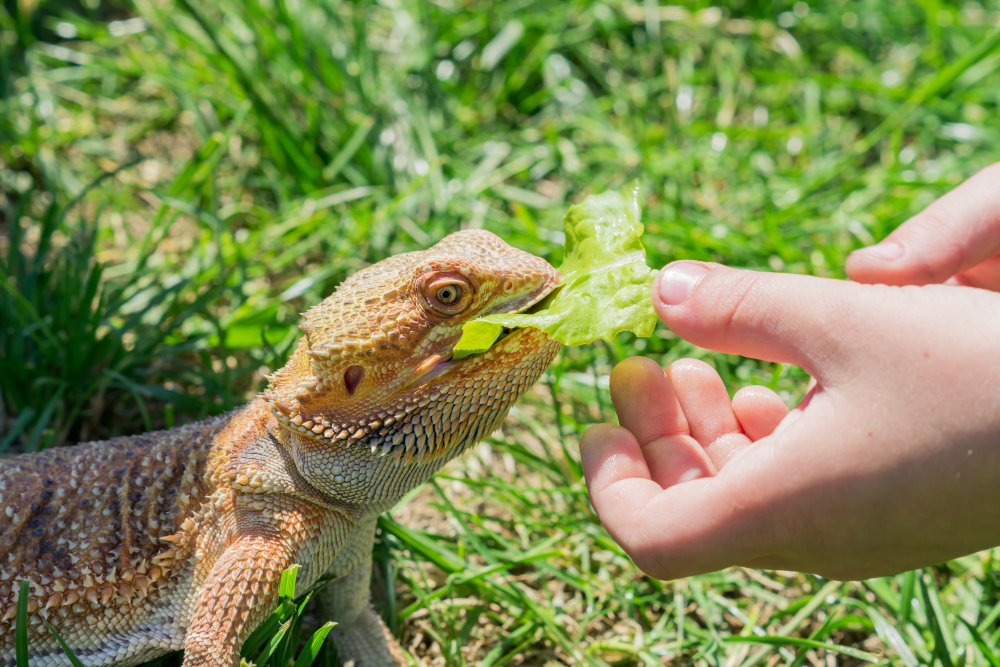Bearded dragons, known scientifically as Pogona vitticeps, have become increasingly popular as household pets due to their distinctive appearance and generally docile nature. These charismatic reptiles, native to the arid regions of Australia, require a balanced and diverse diet to maintain their health and vitality. As pet owners seek to provide the best for their scaly companions, the question of what foods are both safe and beneficial often arises. Cilantro, a leafy green herb commonly used in various cuisines, is one such food that has sparked curiosity. Can these desert dwellers safely consume it, and if so, what are the potential benefits or risks involved?
The analysis that follows delves deep into the dietary needs of bearded dragons, the nutritional profile of cilantro, and its potential place in a dragon’s diet. Through a combination of scientific research and anecdotal evidence, this comprehensive review aims to provide clarity and guidance for those wishing to diversify the meals of their beloved pet while ensuring their safety and well-being.
Can Bearded Dragons Eat Cilantro? A Helpful Guide
Bearded dragons have specific dietary requirements that ensure their health and longevity. When introducing any new food into their diet, it’s crucial to know its nutritional value, potential risks, and benefits. In this guide, we’ll explore the question many bearded dragon owners have: “Can bearded dragons eat cilantro?”
1. Nutritional Value of Cilantro: Cilantro, also known as coriander leaves, is packed with vitamins A, C, and K. It also contains minerals like calcium and potassium. For bearded dragons, these nutrients can help improve their overall health and contribute to strong bones and proper immune function.
2. Benefits of Feeding Cilantro:
- Diversity in Diet: Introducing cilantro occasionally can diversify your bearded dragon’s diet, ensuring they receive a range of nutrients.
- Hydration: Cilantro contains water, which can aid in keeping your bearded dragon hydrated, especially in a controlled environment.
3. Potential Risks and Considerations:
- Oxalates: Like many leafy greens, cilantro contains oxalates, which can bind to calcium and reduce its absorption. In excess, this can lead to calcium deficiency in bearded dragons.
- Moderation is Key: Due to the oxalate content, it’s advisable to feed cilantro in moderation, interspersed with other safe greens and veggies.
4. How to Feed Cilantro to Your Bearded Dragon:
- Wash thoroughly: Before feeding, ensure the cilantro is cleaned thoroughly to remove any chemicals or pesticides.
- Chop into manageable pieces: This ensures easier digestion and reduces the risk of choking.
- Mix with other greens: To provide a balanced meal, mix cilantro with other bearded dragon-safe vegetables and greens.
5. Other Safe Vegetables and Greens for Bearded Dragons:
For a balanced diet, you can mix cilantro with other safe foods such as collard greens, mustard greens, bell peppers, and squash.
While cilantro can be a nutritious addition to a bearded dragon’s diet, moderation is crucial. Ensure that it’s just one of the many varied foods you offer your pet to create a balanced diet. Always monitor your bearded dragon for any changes in behavior or health when introducing new foods and consult with a veterinarian if you’re uncertain about any dietary choices.
The Nutritional Aspects of Cilantro for Bearded Dragons
Cilantro, a popular culinary herb, is more than just a flavorful addition to our dishes. For bearded dragons, it offers a suite of essential nutrients. Rich in vitamins A, C, and K, cilantro can help boost the immune system, promote vision, and aid in blood clotting. Moreover, it also provides minerals like calcium – crucial for bone health in bearded dragons – and potassium, which is vital for muscle function. However, while cilantro is packed with these beneficial nutrients, it also contains oxalates. These compounds can bind to calcium and limit its absorption, which is why it’s essential to understand cilantro’s place in a balanced bearded dragon diet.
How Regularly Can Bearded Dragons Eat Cilantro? – Deciphering the Ideal Frequency
Given the oxalate content in cilantro, it’s crucial to limit its intake. It is advisable to offer cilantro to bearded dragons once a week or interspersed with other greens in their diet. While the vitamins and minerals in cilantro are beneficial, feeding it too often can risk calcium deficiency due to oxalates binding with the calcium. A varied diet ensures that bearded dragons receive all the essential nutrients without an overload of any particular compound.
Tasty Combinations: Foods Bearded Dragons Prefer with Cilantro
Cilantro can be paired with various other safe foods to create a delectable feast for your bearded dragon. Some favorites include:
- Collard Greens: A calcium-rich vegetable that pairs well with cilantro’s flavor.
- Squash: This can be chopped into small, manageable pieces and mixed with cilantro.
- Bell Peppers: A crunchy treat that adds vibrant color and varied texture when combined with cilantro.
- Dandelion Greens: High in calcium and a favorite for many bearded dragons, these greens mix well with cilantro.
When combining these foods, ensure that the portions are balanced, and no single ingredient dominates the mix.
Best Methods: How to Offer Cilantro to Bearded Dragons Safely
Safety and enjoyment go hand-in-hand when feeding your bearded dragon. Follow these steps to offer cilantro safely:
- Clean Thoroughly: Always wash cilantro to rid it of any pesticides or contaminants.
- Chop Carefully: Slice cilantro into small, digestible pieces to prevent choking hazards.
- Offer Fresh: Ensure the cilantro is fresh and free from wilting or decay.
- Combine with Other Foods: Mix cilantro with other safe greens and vegetables to provide a balanced and enticing meal.
- Watch for Reactions: Always monitor your bearded dragon after introducing a new food to their diet. If you notice any adverse reactions or changes in behavior, it might be best to reconsider its place in their diet.
Remember, while cilantro can be a tasty and nutritious treat for your bearded dragon, always prioritize their safety and overall dietary balance.
Wrapping Up: Answering “Can Bearded Dragons Eat Cilantro?”
The world of bearded dragon nutrition can often seem like a maze, with each turn presenting a new question or consideration. When it comes to cilantro, the answer is a resounding yes – but with a few caveats. Cilantro offers a host of beneficial vitamins and minerals that can enhance the health of our scaly friends. However, its oxalate content necessitates moderation. By interspersing cilantro with other greens and vegetables, not only do we maintain a diverse and balanced diet for our bearded dragons, but we also ensure they’re receiving a medley of essential nutrients without the risk of any particular compound’s overload.
The key, as with many aspects of pet care, lies in balance and attentiveness. Regularly observing your bearded dragon and adjusting their diet based on their needs and reactions will ensure a happy, healthy life for your pet. So, the next time you’re chopping up some cilantro for your salad, remember that with a little care and moderation, your bearded dragon can join in on the culinary delight!

